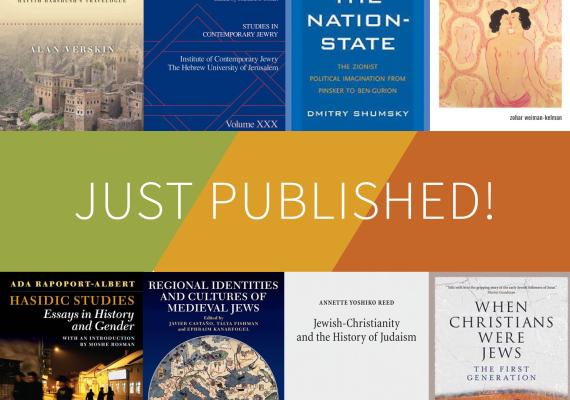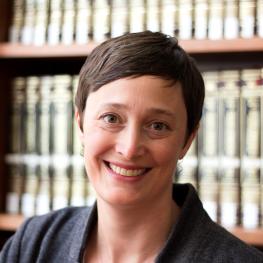Alumni Books

Alumni of our fellowship program published a spate of books in 2018. Here is just a taste.
In connection with this year’s fellowship theme, current fellow Alan Verskin just published A Vision of Yemen: The Travels of a European Orientalist and His Native Guide (Stanford), the first English translation of a nineteenth-century Yemeni Jewish travelogue. Hayyim Habshush accompanied the European Orientalist Joseph Halévy through Habshush’s home country, and his book records their experiences.
The connection to place is also explored elsewhere in Jewish modernity, in three-time fellow (2000–2001: The Arts, 1998–1999 Poetry/Enlightenment, and 2013–2014: Early Modernity) Richard I. Cohen’s edited collection on the topic of Place in Modern Jewish Culture and Society (Oxford). Its contents address the relationship of Jews to the places they inhabit across the globe over the past three hundred years.
Zionism also expresses a Jewish relationship to place, but Dmitry Shumsky (2011–2012: Travel) explores a different dimension of it in Beyond the Nation-State: The Zionist Political Imagination from Pinsker to Ben-Gurion (Yale). He challenges the prevailing narrative of a single-minded Zionist quest for a nation-state by looking at the alternative political regimes imagined and advocated by prominent Zionist thinkers before 1948.
In a different vein, Zohar Weiman-Kelman (2015–2016: Beyond Reason)’s Queer Expectations: A Genealogy of Jewish Women’s Poetry appeared last month. The book explores how Jewish women writers turned to poetry to resist the historical limitations imposed on them. Turning a queer methodological eye on this literature, Weiman-Kelman offers a new interpretation of works in English, Yiddish, and Hebrew from the late nineteenth and twentieth centuries.
Gender is also explored in a new collection of essays by Ada Rapoport-Albert (2002–2003: Eastern Europe and 2013–2014: Early Modernity). Hasidic Studies: Essays in History and Gender (Oxford) updates Rapoport-Albert's path-breaking research to engage with recent work and includes a forward by Moshe Rosman (2002–2003: Eastern Europe and 2005–2006: The Book).
A new volume of essays on the medieval Jewish world looks at the formation of the regional identities that would be so defining at the dawn of modernity. Edited by Javier Castaño (2010–2011: Conversion), Talya Fishman (2003–2004: Anthropology & History), and Ephraim Kanarfogel (2003–2004: Anthropology & History and 2010–2011: Conversion), Regional Identities and Cultures of Medieval Jews (Oxford) explores the emergence of distinct geographical subcultures within medieval Jewish culture.
Turning now to the ancient world, in a testament to the long-term impact of participation in a fellowship year, two alumnae of the Late Antiquity year are reconsidering the very early history of Christianity in its Jewish contexts. Annette Yoshiko Reed (2007–2008: Late Antiquity and 2014–2015: Wissenschaft) looks at sects that expressed allegiance to both Judaism and Jesus, in Jewish-Christianity and the History of Judaism: Collected Essays (Mohr Siebeck).
And Paula Fredriksen (2007–2008: Late Antiquity) produced When Christians Were Jews: The First Generation (Yale), exploring the very earliest history of Jerusalem-based followers of Jesus, shedding light on the formation of the movement that would come to be called Christianity.
